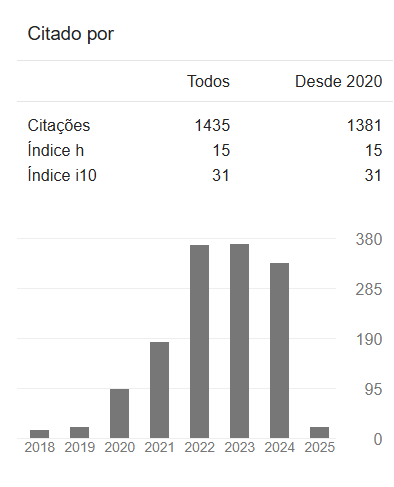USE OF JAMBOARD® AS A DIDACTIC AND EVALUATIVE RESOURCE IN HIGHER EDUCATION
DOI:
10.23926/RPD.2022.v7.n1.005.id1366Keywords:
Evaluation, Graduation, Teaching MethodologyAbstract
This text addresses the use of active methodologies in Ensino Remoto Emergencial, in the context of the COVID-19 Pandemic. Aiming present the use of Google's Jamboard®️ tool as a didactic and evaluative resource within the scope of a compulsory subject in undergraduate courses throughout the 1st academic semester of 2021. The experience report was used as a methodology, in reflexive critical dynamics, contributing to the problematization of pedagogical practice and to the initial training of teachers. Among the results, we highlight the challenges of education in pandemic times, records of negative points in the use of the tool, and also evidence of the validity of the proposal and effectiveness of the Jamboard®️ as a reflective portfolio and a procedural, formative and summative assessment instrument.
Downloads
Metrics
References
BACICH, Lilian; MORAN, José. (org.). Metodologias ativas para uma educação inovadora: uma abordagem teórico-prática. São Paulo: Penso, 2018.
BERGAMANN, Jonathan; SAMS, Aaron. Sala de aula invertida: uma metodologia ativa de aprendizagem. Rio de Janeiro: LTC, 2016.
CASTRO, Roney Moreira de; SIQUEIRA, Sean Wolfgand Matsui; MONTEIRO, Sandrelena da Silva. Didática da Computação na Perspectiva da Aprendizagem Ativa. In: WORKSHOPS DO CONGRESSO BRASILEIRO DE INFORMÁTICA NA EDUCAÇÃO, 9., 2020, Porto Alegre. Anais [...]. Porto Alegre: Sociedade Brasileira de Computação, 2020. p. 31-40. Disponível em: https://sol.sbc.org.br/index.php/wcbie/article/view/13022. Acesso em: 14 jul. 2021. DOI: https://doi.org/10.5753/cbie.wcbie.2020.31
DUARTE, Adriana Otoni Silva Antunes; CAMPOS, Regina Helena de Freitas. Escola Ativa no Brasil na obra da Psicóloga e Educadora Helena Antipoff. Psicologia Escolar e Educacional, [s.l.], v. 24, 2020. p. 1-12. Disponível em: https://www.scielo.br/j/pee/a/ZzDm9ZQfGW3dkXN3dX4DM4K/?format=pdf&lang=pt. Acesso em: 03 jan. 2022. DOI: https://doi.org/10.1590/2175-35392020200499
FERRARINI, Rosilei; SAHEB, Daniele; TORRES, Patricia Lupion. Metodologias ativas e tecnologias digitais: apro¬ximações e distinções. Revista Educação em Questão, Natal, v. 57, n. 52, e- 15762, abr./jun. 2019. p. 1-30. Disponível em: https://periodicos.ufrn.br/educacaoemquestao/article/view/15762. Acesso em: 29 set. 2021. DOI: https://doi.org/10.21680/1981-1802.2019v57n52ID15762
FREIRE, Paulo. Pedagogia da Autonomia: saberes necessários à prática educativa. São Paulo: Paz e Terra, 2020.
FREIRE, Paulo. Pedagogia da Esperança: um reencontro com a Pedagogia do Oprimido. São Paulo: Paz e Terra, 2016.
GÓIS, Amanda Regina da Silva; GÓIS, Camila Gabriela da Silva; BARBOSA, Paulo Felipe Candido. Mapa conceitual no ensino presencial ao remoto durante a pandemia do coronavírus: relato de experiência. Research, Society and Development, [s.l.], v. 10, n. 3, 2021. Disponível em: https://www.rsdjournal.org/index.php/rsd/article/view/13795/12344. Acesso em: 29 set. 2021. DOI: https://doi.org/10.33448/rsd-v10i3.13795
HERNÁNDEZ, Fernando. Transgressão e mudança na educação: Os projetos de trabalho. Porto Alegre: ARTMED, 1998.
MODELSKI, Daiane; GIRAFFA, Lúcia Maria Martins; CASARTELLI, Alam de Oliveira. Tecnologias digitais, formação docente e práticas pedagógicas. São Paulo: Educação e Pesquisa, São Paulo, v. 45, 2019. Disponível em: https://www.scielo.br/pdf/ep/v45/1517-9702-ep-45-e180201.pdf. Acesso em: 28 set. 2021. DOI: https://doi.org/10.1590/s1678-4634201945180201
NASCIMENTO, Gabriela Matias; ARAÚJO, André Fellipe Queiroz; SANTOS, Marilene Rosa. TIC’s como recurso didático para o ensino de geometria no 6º ano do Ensino Fundamental. Revista Epistemologia e Práxis Educativa, Teresina, ano 04, v. 041, n. 01, jan./abr., 2021. Disponível em: https://comunicata.ufpi.br/index.php/epeduc/article/viewFile/12525/7363. Acesso em: 29 set. 2021.
OLIVEIRA, João Lucasdo Santos et. al. Sala de aula 4.0: Uma proposta de Ensino Remoto Baseado em Sala de Aula Invertida, Gamification e PBL. RBIE: Revisa Brasileira de Informática na Educação, [s.l.], v. 28, 2020. Disponível em: https://www.br-ie.org/pub/index.php/rbie/article/viewFile/v28p909/6746. Acesso em: 27 set. 2021. DOI: https://doi.org/10.5753/rbie.2020.28.0.909
PERRENOUD, Philippe. 10 novas competências para ensinar. Porto Alegre: Artmed, 2000.
PIAGET, Jean. Para onde vai a educação? 14 ed. Rio de Janeiro: José Olympio, 1998.
SCHNEIDER, Eduarda Maria et al. O uso das Tecnologias Digitais da Informação e Comunicação (TDIC): possibilidades para o Ensino (não)presencial durante a Pandemia da COVID-19. Revista Científica Educ@ção, [s.l.], v. 4, n. 8, out., 2020. Disponível em: https://periodicosrefoc.com.br/jornal/index.php/RCE/article/view/123/109. Acesso em: 29 set. 2021. DOI: https://doi.org/10.46616/rce.v4i8.123
VALENTE, José Armando. A sala de aula invertida e a possibilidade do ensino personalizado: uma experiência com a graduação em midialogia. In: BACICH, Lilian.; MORAN, José. (org.). Metodologias ativas para uma educação inovadora: uma abordagem teórico-prática. São Paulo: Penso, 2018. p. 77-108.
Downloads
Published
How to Cite
Issue
Section
License
Copyright (c) 2023 A Revista Prática Docente tem o direito de primeira publicação

This work is licensed under a Creative Commons Attribution-NonCommercial 4.0 International License.
Authors who publish in this journal agree to the following terms:
- Authors retain the copyright and grant the journal the right of first publication, with the paper simultaneously licensed under the Licença Creative Commons Attribution allows the sharing of the work with acknowledgment of authorship and initial publication in this journal.
- Authors are authorized to take additional contracts separately, for non-exclusive distribution of the version of the work published in this journal (e.g. publish in institutional repository or as a book chapter), with acknowledgment of authorship and initial publication in this journal.











